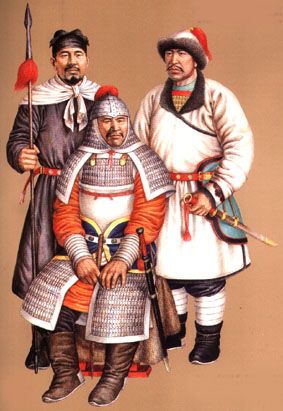Jurchen (Jin) Dynasty warriors. After a series of raids conducted all along Liao’s western frontiers, Aguda went over to a general attack and began taking the Liao subordinate capitals one by one, sometimes with the help of the native Chinese dynasty occupying the rest of China, the Northern Song (960–1126). Aguda died before completing his conquest of Liao, but his successor Wuqimai, or Taizong (1075–1135), not only completed his task, but even began a massive invasion of Song.
The Nan Song, through continuous development, eventually became wealthier than the Bei Song had been. Though its capital was near the sea—the only such instance among the Chinese empires— and international trade increased, the country was not sea-oriented. Gaozong maintained a defensive posture against periodic Juchen incursions from the north and meanwhile proceeded to restore imperial authority in the hinterland as far west as the strategic Sichuan and in parts of Shaanxi to its immediate north.
No less important was the need for adequate military forces. Neither conscription nor recruitment would suffice. Because his position was militarily weak but financially strong, Gaozong adopted the zhao’an policy, which offered peace to the various roving bands. The government granted them legitimate status as regular troops, and it overlooked their minor abuses in local matters. Thus, the size of imperial forces swelled, and the problem of internal security was largely settled. The court then turned its attention to the control of these armies, which was inseparable from the issue of war or peace with the Juchen.
Gaozong did not want to prolong the war; he valued most the security of his realm. A few minor victories did not convince him that he could hope to recover northern China. Rather, he saw war as a heavy drain on available resources, with the risk of eventual defeat. Nor did he feel comfortable with the leading generals, on whom he would have to rely in case the war went on. He had to get around the critics at court, however, who found the Juchen peace terms humiliating and unacceptable: in addition to an enormous yearly tribute, the Juchen demanded that the Nan Song formally admit, with due ceremonials, its inferior status as a vassal state. The shrewd emperor found an impeccable excuse for accepting the terms by claiming filial piety: he sought the return of his mother from captivity. To this no Confucian could openly object. Significantly, Gaozong refrained from asking the release of former emperor Qinzong, as such a move would have called into question the legitimacy of his succession. A dramatic crisis occurred in 1141. On the eve of concluding peace negotiations, Gaozong decided to strip the three leading generals of their commands. The generals, summoned to the capital on the pretext of rewarding their merits, were promoted to military commissioners, while their units were reorganized into separate entities directly under imperial control. Two of the generals reconciled themselves to the nominal honours and sizable pensions, but the third, Yue Fei, openly criticized the peace negotiations. He was put to death on a trumped-up charge of high treason. He later became the subject of a great legend, in which he was seen as a symbol of patriotism. At the time, however, his elimination signified full internal and external security for the court.
In spite of Gaozong’s personal inclination, his artful guiding hand, and the success of his efforts to consolidate the empire, the impulse remained strong among many idealistic Confucians to attempt to recover the central plains. Even when silenced, they were potentially critical of court policies. Gaozong eventually decided to abdicate, leaving the matter to his adopted heir, but he retained control from behind the throne. The new emperor, Xiaozong (reigned 1163–89), sympathetic to the idealists, appointed several of them to court positions and command posts. Information about a Juchen palace coup and alleged unrest in the Juchen empire, particularly in the parts recently occupied, led to a decision to resume the war. An initial Song attack was repulsed with such heavy losses that even regrouping took some time to accomplish. Sporadic fighting went on for nearly two years in the Huai valley, reflecting a military stalemate. The outcome, in 1165, was a significant change in the new peace formula: the vassal state designation was dropped, and the Nan Song attained a nearly equal footing with the Juchen, although it had to defer to the latter empire as the senior one.
After the death of Gaozong in 1187, Xiaozong followed the precedent of abdicating. The international peace was kept during the brief reign of his son, Guangzong (reigned 1190–94), but it was broken again in 1205, during the reign of his grandson, Ningzong (reigned 1195– 1224). The 40-year span of continuous peace dimmed the memory of difficulties in waging war. A new generation, nurtured by a flourishing Confucian education, tended to underestimate enemy strength and to think once more about recovering the central plains. The Nan Song again initiated a northward campaign, and again it met with defeat. The event left no doubt that the Juchen empire’s hold over northern China was far beyond the military capability of the southern empire alone. It was also obvious that the Chinese population in northern China consisted of new generations brought up under alien domination and accustomed to it.
The Juchen not only retained their military edge over the Nan Song but also revived their ambition of southward expansion. An offer was made to the governor of Sichuan, who decided to turn against the Song court in faraway Lin’an and to become king of a vassal state allied with the Juchen. The civilian officials around him, however, took quick action and ended his separatist rebellion. Though a passing danger, it highlighted the fact that the Nan Song consolidation was not entirely secure; peace was preferred.
